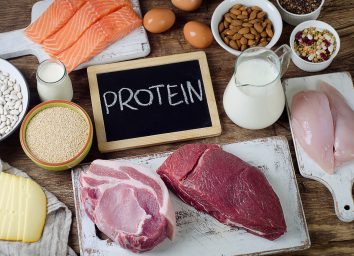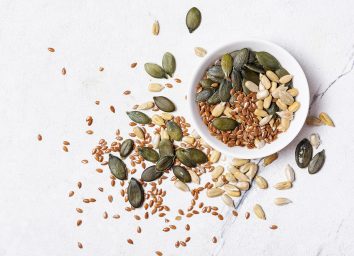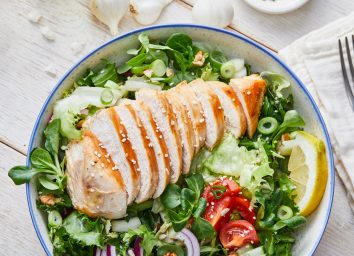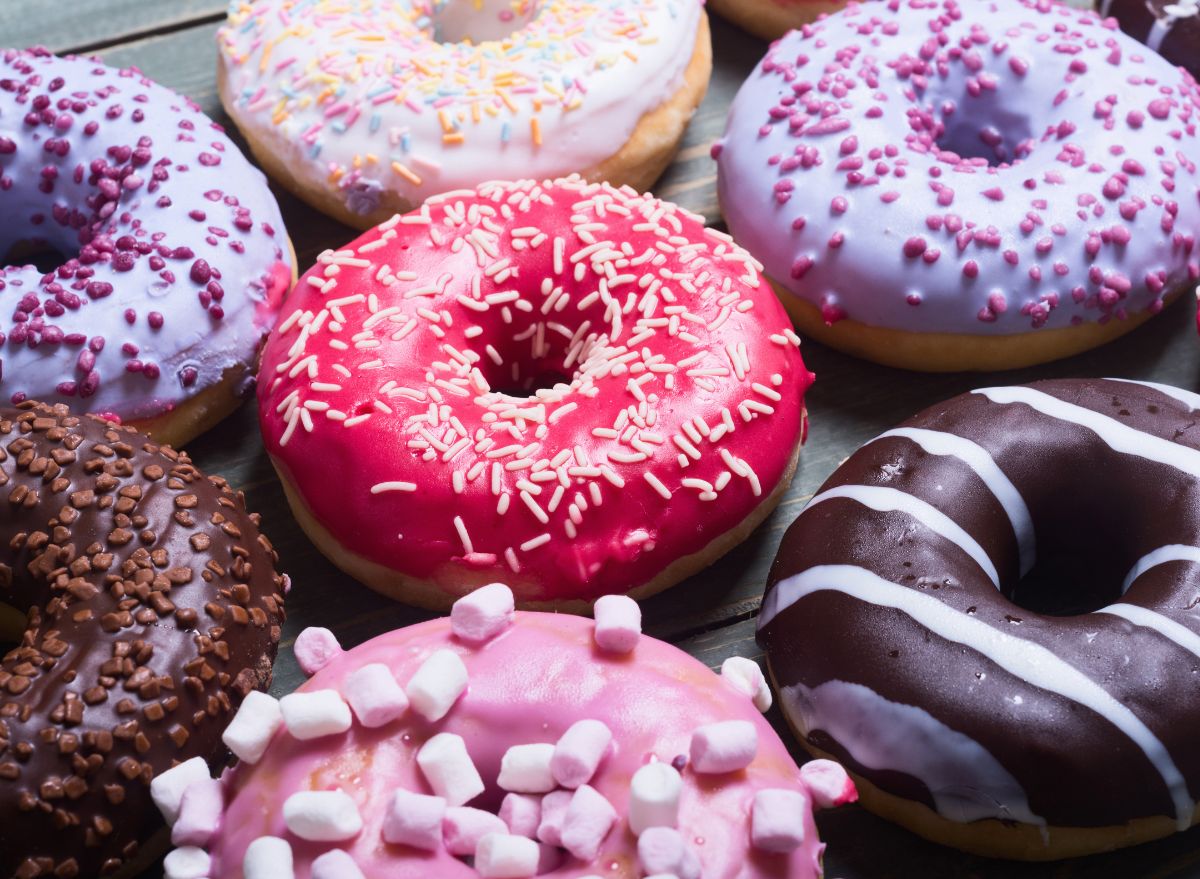
The obesity epidemic shows no signs of slowing down. A recent 2022 State of Obesity Report found that 19 states now have obesity rates topping 35 percent and that 4 in 10 U.S. adults are obese. If your weight has been a struggle, it's not all your fault. Our food supply plays a big role. The report details how easy access to affordable, low-quality "junk" food and soda make it hard to control your weight.
While no single food or beverage is responsible for your weight, obesity researchers have identified foods and beverages that are consistently linked to weight gain. Generally, these foods tend to be highly palatable (aka, delicious), ultra-processed, and rapidly digestible because they often lack fiber and protein. And, most importantly, they are all calorie-rich, making it hard to stick to your overall daily calorie goals.
Some common examples of ultra-processed culprits that experts cite are sugar-sweetened beverages, deli meats and shelf-stable meat snacks, potato and other fried salty snacks, French fries, ice cream, and donuts.
Not only do these nutrient-poor calorie bombs up your risk for weight gain, research that was recently published in JAMA Neurology reported that in a study of more than 10,000 adults, those who ate 20% or more of their daily calories come from ultra-processed foods had increased risk for cognitive decline. What's more, the average American is getting more than half of their daily calories from lower-quality processed foods.
With all of this information in mind, let's take a closer look at some of the foods and beverages you'll want to avoid in order to lose weight in 2023.
Processed meat and poultry products
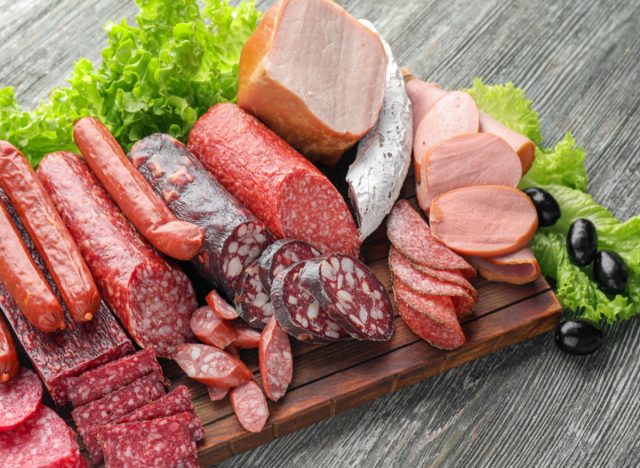
If you like deli meat, bacon and sausage, shelf-stable meat sticks, and other processed animal-based products, you may want to reconsider how much you're consuming. One study published in BMC Research Notes found that processed meat intake was directly correlated with increases in belly fat and central obesity. Central obesity is defined as having a BMI over 30 kg/m2, as well as a waistline measurement of at least 40 inches for men and 34.5 inches for women.
Subjects who reported eating the most processed meats experienced a 22% increase in risk for central obesity compared to subjects who ate the least amount of processed meats. If weight is a concern for you this year, you may want to limit your processed meat and poultry consumption and opt for fresher, leaner cuts of meat and poultry to help you stick to the recommended daily limit for calories, saturated fat, and sodium.
Fried potato-based foods
A meta-analysis published in the New England Journal of Medicine reported that one study with more than 120,000 middle-aged women found that potato chips (and other processed potato products) were highly correlated with weight gain.
Another study that was published in the American Journal of Clinical Nutrition found that individuals who reported eating fried potato foods (i.e. French fries and potato chips) were at an increased risk for diabetes, other co-morbidities, and even premature death, compared to those who reported eating fewer potato-based foods and fried potato products.
French fries and potato chips pack in more calories per serving that most other foods. Consider that a medium order of McDonald's fries has 320 calories and about 20% of the fat you need in a day. The researchers also identified that other more natural, nutrient-rich foods were associated with less weight gain over time. These foods included fruits and vegetables, whole grains, nuts, and yogurt.
Donuts
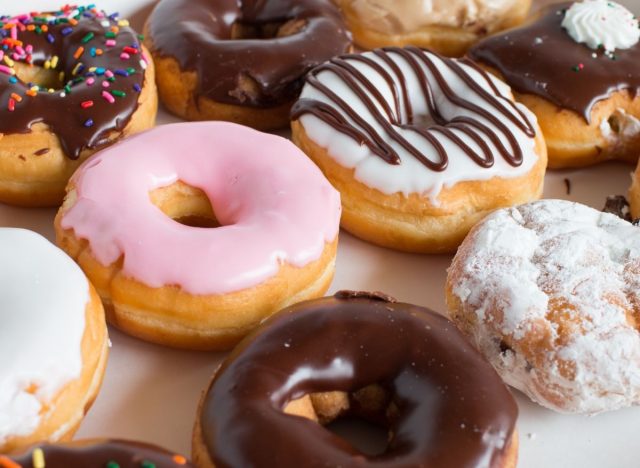
You might think having one donut won't derail your diet, but these office meeting treats are more harmful for your waistline than you may believe. Donuts are rich in refined, low-fiber flour and added sugar, and they are fried, making them extremely high in calories.
The worst part of a morning donut may be that the foods you eat for breakfast help set your appetite and hunger hormones for the entire day. A donut and coffee may trigger cravings for other refined carbs and high-calorie foods well into the afternoon. On the other hand, a protein-based breakfast can keep hunger and appetite in check, boost metabolism, conquer cravings, and help build and maintain muscle mass that helps blast belly fat.
Eggs, low-fat yogurt, and cottage cheese are great high-protein morning options to enjoy. In fact, one study from the American Journal of Clinical Nutrition found that when women doubled their daily protein intake from 15 to 30% of their daily calories, it led to more sustained weight loss.
Ice cream
Ice cream is often on the list of most "addictive" foods. Studies show that the creamy frozen treat lights up the feel-good areas of your brain, making it the ultimate comfort food. What's more, frequently eating ice cream causes you to crave more in order to get the same level of satisfaction. The combination of sugar and fat in ice cream is what makes it so delicious and crave-worthy.
Sugary drinks

While sugary drinks are a beverage and not a food, plenty of research reveals that drinking sugar-sweetened beverages like soda or energy drinks can increase your odds of gaining weight. A recent study in Nature Reviews Endocrinology cites a robust body of evidence pointing to sugary beverages being linked to weight gain, type 2 diabetes, cardiovascular disease, and some types of cancer. In the United States, sugar-sweetened beverages are the number one source of added sugar in the typical diet.
They are nothing more than flavored sugar water and don't provide any satiety. The calories are rapidly absorbed and can lead to spikes in blood sugar and insulin. In a comprehensive review, researchers reported in the American Journal of Clinical Nutrition that for every per-serving daily increase of a sugar-sweetened beverage that adults enjoyed, it equaled about a half-pound increase in weight over a one-year period.
One study in the Journal of the American Medical Association found that women who increased their intake of soft drinks from less than one per week to more than one per day added 358 calories to their daily diet and gained about 10 pounds over the four-year study. On the other hand, women who cut back on their soft drink consumption reduced their daily calories by about 319 per day and gained less weight than the soft drink sippers.


